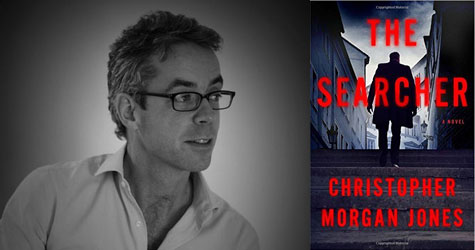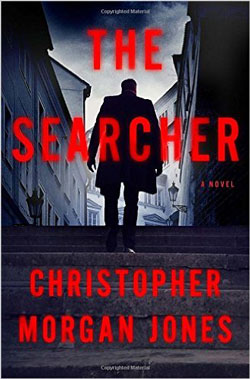
I wanted to set a story in a small country that was overshadowed by a more powerful one—somewhere beautiful and troubled that had a history of resisting an aggressive, underhanded, massive neighbor. The world is full of these conflicts, and they’ve always fascinated me.
I live in London, the confident and overbearing capital of a country that hasn’t been invaded for a thousand years. This is a safe place, in all sorts of ways, and for a thriller writer, finding or creating an environment that isn’t safe is as important as character and plot.
 Georgia was the most compelling candidate. I’ve been fascinated with Russia for a long time, and as the strong, meddling neighbor, it was probably the only choice. Of all the smaller countries along its border, Georgia had all the necessary elements—it’s an ancient country, much older than Russia, somehow at the center of the world and completely outside it. It has its own religion, its own language, its own alphabet—all of which it has clung on to, despite being invaded and occupied countless times over the last two millennia. In the west, it has beaches and seaside resorts; in the north and east, immense mountains; and in Tbilisi, a small but riveting capital (it only has a population of a million or so, but in its long and violent history, it has seen as much as any of the world’s great cities).
Georgia was the most compelling candidate. I’ve been fascinated with Russia for a long time, and as the strong, meddling neighbor, it was probably the only choice. Of all the smaller countries along its border, Georgia had all the necessary elements—it’s an ancient country, much older than Russia, somehow at the center of the world and completely outside it. It has its own religion, its own language, its own alphabet—all of which it has clung on to, despite being invaded and occupied countless times over the last two millennia. In the west, it has beaches and seaside resorts; in the north and east, immense mountains; and in Tbilisi, a small but riveting capital (it only has a population of a million or so, but in its long and violent history, it has seen as much as any of the world’s great cities).
In the ten years before I started writing the book, it had been genuinely independent in a way that it hadn’t been for around eight hundred years, and the Russians didn’t like that. In 2008, they invaded, briefly, advancing to within thirty miles of Tbilisi and causing a major diplomatic crisis in the process. Tension between the two countries has been high ever since.
The other thing I knew was that I wanted a new lead character. Ben Webster, a detective/spy for hire, had been the hero of the first two books, which had also featured his boss, Isaac Hammer, in an important but secondary role. I enjoyed writing Hammer, and the readers I’d spoken to enjoyed reading him. So, over time, he made an insistent claim for his own book.
Webster’s incidental qualities match my own—he’s a little younger than I am, but he has a family, lives in north London, and likes to swim. To write about someone who was less close to me seemed more fun, as much as anything else, and I liked the fact that Hammer is an unusual hero within the genre. He’s rich, and the founder of a hugely successful company. There was something appealing about the idea of throwing someone used to command into a world where he had no power at all.
The book only received a title when it was finished, but it could have been in my mind throughout the writing. Hammer is searching. He’s searching for Webster, who has gotten himself embroiled in some particularly dark political mystery while in Georgia, ostensibly, for the funeral of a friend. And, he’s searching for life as it ought to be lived, having shut down decades before.
Hammer is a talented and wealthy man, who appears to live a fulfilled, satisfying life, and at the beginning of the book, we find him struggling to save the company he has built and the reputation that goes with it. By any external standard, he’s a success, and his legacy is important to him, but he lives alone, he runs too much, and he takes medication for his mood. Throughout previous books, I’d always known that he was constrained and, while not unhappy, not happy either. For twenty years, he has been living life through his cases and his clients, growing on the outside and shriveling within.
Georgia is far too full of energy and chaos to let anyone maintain that kind of self-deception. I had never been (this may have played a part in deciding where to set the book), but within hours of getting off the plane, I knew I’d made the right choice. There’s something elemental about the place that makes you realize how possible it is to become detached in the big cities of the West—and Hammer feels it immediately, not least because he arrives to find himself in the middle of a riot. All his things are stolen—his clothes, his passport, his medication—and he’s stripped of everything else: his network of contacts, the influence he’s used to wielding, even the ability to talk people round (Hammer is a talker).
From Tbilisi, he’s drawn inescapably to a remote region in the mountains, called Tusheti, which can only be reached by one of the world’s most dangerous roads. Tusheti looks like paradise, but it’s bordered to the north by Chechnya and to the east by Dagestan, and when you’re there, it’s impossible not be conscious, amid all the beauty, of the conflicts going on just across its borders.
I went there by chance, after I was lucky enough to meet an honorary Georgian, weeks before my visit, who told me I had to go. I remain supremely grateful both for the experience itself and for the chance introduction to a place that inspired and shaped the whole book.
To learn more or order a copy, visit:
Christopher Morgan Jones worked at the world’s largest business intelligence agency for eleven years. He has advised Middle Eastern governments, Russian oligarchs, New York banks, London hedge funds, and African mining companies. He is the author of The Silent Oligarch and The Jackal’s Share.
